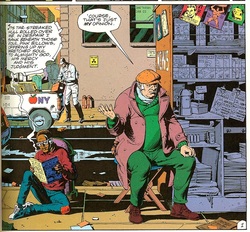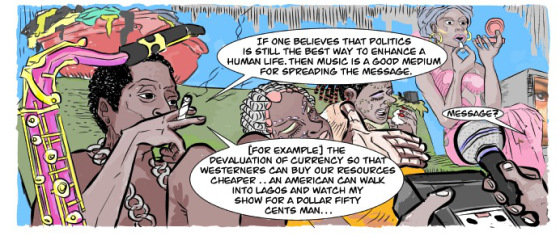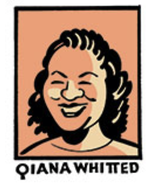|
Originally posted at Pencil Panel Page. The answer to this post’s title is both, of course. But I’ve posted the question in order to think about the different kinds of reading (and viewing) experiences that comics generate and why we value certain storytelling modes over others. Thanks to an article in Colorlines, I recently discovered 3bute, a transnational online comics “mashable anthology” that describes its goal as “adding visuals and crowdsourced context to African literature and journalism on the web.” Artist Bunmi Oloruntoba and editor Emmanuel Iduma collaborate with reporters and creative writers to furnish “the contexts often missing when African stories are reported.” Every two weeks, 3bute [pronounced "tribute"] publishes a three-page comic from a different African country in which readers tag the images like a wiki page with links to videos, articles, slide shows, twitter posts, music tracks, and other media. The resulting comic is dotted with icons that appear as you touch or move your mouse over its surface. The interactive features blink and pop as you shift from panel to panel in the site’s effort to undermine “the single, one-dimensional story of poverty, sickness, conflict” that far too often disparages the continent. 3bute uses new technology to explore the contours of African modernity through “multifaceted stories,” arguably drawing upon the collaborative traditions that are reminiscent of the open-ended serial narratives from the early-twentieth century – Bud Fisher’s Mutt and Jeff or The Gumpsby Sidney Smith, for instance – newspaper strips that welcomed audience interaction with the world of the characters. But I’m especially interested in how 3bute comics heighten our awareness of the tensions between sequence and surface in ways that can overwhelm as the web page becomes a tactile landscape in which ancillary stories are seeded. Indeed, an encounter with a 3bute comic is confusing for a first-time reader. The pages are busy and baffling. The pop-up screens often obscure the image and text. And while not all the links open entirely new screens, each tag nudges you out of the primary text and into some unexpected aspect of the story’s social and political reality. Though the site describe the engagement as immersive, a term frequently used to describe the sensations of interactive media, one cannot plunge into these stories and be absorbed into their plots in ways that are commonly associate with an engrossing novel or film. The comic turn us into readers who are invariably outward-looking. We are encouraged to take on a posture that is expansive, in which the open and extensive scope of the terrain beyond the story is the story we are meant to see and hear. Once you take the site’s advice and “drive slowly” over the 3bute comic, the ride can be quite impressive. One of my favorites is #11, “When You Kill Us, We Rule!” adapted from the last interview with Afrobeat legend Fela Anikulapo Kuti. In the comic, journalist Keziah Jones describes the experience of meeting Fela before asking him to reflect upon the effectiveness of music as a medium of political change. The musician’s response moves into a meditation on the power of protest when a people sacrifice themselves for a larger cause. Music, video clips, and interviews dot the first half the comic, but then shift to links about Nigerian oil, money laundering, and corruption. I’ve found it best to read and view the comic completely first before clicking through the tagged material (a practice that works much better on a mobile device than the computer, importantly enough). You can spend an hour on a three-page comic like this and come away with a richly informative and deeply rewarding reading experience.  Yet reading 3bute makes me wonder to what extent most — if not all – comic artists and writers regard their pages as “mashable surfaces” too. I am thinking, for example, about the building signs, newspaper clippings, and wrappers from the Gunga Diner that litter the streets of Watchmen. The manner in which comics sometimes resist the immersive experience is a quality that I have tried to make excuses for in the past, as if it is a challenge that readers and viewers must overcome in order to fully enjoy the narrative. But now I’d like to push back on this expectation. Reading the tiny print on the crumpled papers in the trash is part of the story that Dave Gibbons wants us to enjoy (“You mean we have to read the trash? my students ask), as is the way Moore lifts Tales of the Black Freighter out of the character’s hands and places it into our own. My point here is not to compare or attempt to legitamize 3bute through other comics, but to suggest that the online comics anthology makes the question of how we negotiate the clashing tensions of the form more urgent, particularly when the allusions and contextual material push us further out of the story, rather than pulling us in. What do we lose when we continue to insist that comics should offer an immersive reading experience, rather than an expansive one? (Is there a better term or concept that you might use instead?) Take a look at 3bute while you are at it, and let me know what you think. Comments are closed.
|
AboutAn archive of my online writing on comics, literature, and culture. (Illustration above by Seth!) Categories
All
Archives
July 2020
|


 RSS Feed
RSS Feed